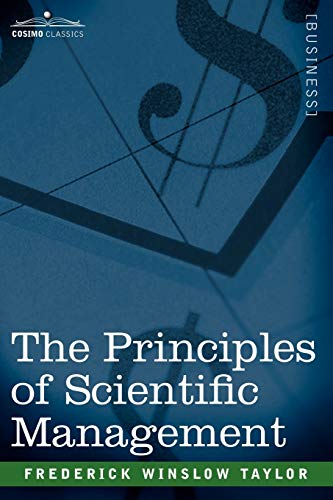Items related to The Principles of Scientific Management

Synopsis
It seems, at first glance, like an obvious step to take to improve industrial productivity: one should simply watch workers at work in order to learn how they actually do their jobs. But American engineer FREDERICK WINSLOW TAYLOR (1856-1915) broke new ground with this 1919 essay, in which he applied the rigors of scientific observation to such labor as shoveling and bricklayer in order to streamline their work... and bring a sense of logic and practicality to the management of that work. This highly influential book, must-reading for anyone seeking to understand modern management practices, puts lie to such misconceptions that making industrial processes more efficient increases unemployment and that shorter workdays decrease productivity. And it laid the foundations for the discipline of management to be studied, taught, and applied with methodical precision.
"synopsis" may belong to another edition of this title.
From the Back Cover
For more than 80 years, this influential work by Frederick Winslow Taylor--the pioneer of scientific management studies--has inspired administrators and students of managerial techniques to adopt productivity-increasing procedures. Indeed, this book laid the groundwork for modern organization and decision theory.
As an engineer for a steel company, Taylor made careful experiments to determine the best way of performing each operation and the amount of time it required, analyzing the materials, tools, and work sequence, and establishing a clear division of labor between management and workers. His experiments resulted in the formulation of the principles expounded in this remarkable essay, first published in 1911.
Taylor advocated a scientific management system that develops leaders by organizing workers for efficient cooperation, rather than curtailing inefficiency by searching for exceptional leaders someone else has trained. The whole system rests upon a foundation of clearly defined laws and rules. Moreover, the fundamental principles of scientific management apply to all kinds of human activities, from the simplest individual acts to the most elaborate cooperative efforts of mighty corporations. Correct application of these principles, according to Taylor, will yield truly astonishing results.
Unabridged Dover (1998) republication of the work published by Harper & Brothers Publishers, New York, 1911.
About the Author
Frederick Winslow Taylor (1856-1915) was an American mechanical engineer who sought to improve industrial efficiency. He is regarded as the father of scientific management and was one of the first management consultants. Taylor was one of the intellectual leaders of the Efficiency Movement and his ideas, broadly conceived, were highly influential in the Progressive Era. Taylor was a mechanical engineer who sought to improve industrial efficiency. Taylor is regarded as the father of scientific management, and was one of the first management consultants and director of a famous firm. Taylor was also an accomplished tennis player. He and Clarence Clark won the first doubles tournament in the 1881 U.S. National Championships, the precursor of the U.S. Open. Future U.S. Supreme Court justice Louis Brandeis coined the term scientific management in the course of his argument for the Eastern Rate Case before the Interstate Commerce Commission in 1910. Brandeis debated that railroads, when governed according to the principles of Taylor, did not need to raise rates to increase wages. Taylor used Brandeis's term in the title of his monograph The Principles of Scientific Management, published in 1911. The Eastern Rate Case propelled Taylor's ideas to the forefront of the management agenda. Taylor wrote to Brandeis "I have rarely seen a new movement started with such great momentum as you have given this one."
"About this title" may belong to another edition of this title.
£ 2.74 shipping within United Kingdom
Destination, rates & speedsSearch results for The Principles of Scientific Management
The Principles of Scientific Management
Seller: Phatpocket Limited, Waltham Abbey, HERTS, United Kingdom
Condition: Good. Your purchase helps support Sri Lankan Children's Charity 'The Rainbow Centre'. Ex-library, so some stamps and wear, but in good overall condition. Our donations to The Rainbow Centre have helped provide an education and a safe haven to hundreds of children who live in appalling conditions. Seller Inventory # Z1-AA-003-00481
Quantity: 1 available
The Principles of Scientific Management
Seller: ThriftBooks-Atlanta, AUSTELL, GA, U.S.A.
Paperback. Condition: Very Good. No Jacket. May have limited writing in cover pages. Pages are unmarked. ~ ThriftBooks: Read More, Spend Less 0.35. Seller Inventory # G1596058897I4N00
Quantity: 1 available
Principles of Scientific Management
Seller: Better World Books, Mishawaka, IN, U.S.A.
Condition: Very Good. 1 Edition. Used book that is in excellent condition. May show signs of wear or have minor defects. Seller Inventory # 10723402-6
Quantity: 1 available
Principles of Scientific Management
Seller: GreatBookPricesUK, Woodford Green, United Kingdom
Condition: New. Seller Inventory # 4969509-n
Quantity: Over 20 available
The Principles of Scientific Management
Seller: Ria Christie Collections, Uxbridge, United Kingdom
Condition: New. In. Seller Inventory # ria9781596058897_new
Quantity: Over 20 available
The Principles of Scientific Management
Seller: Rarewaves.com UK, London, United Kingdom
Paperback. Condition: New. Seller Inventory # LU-9781596058897
Quantity: Over 20 available
Principles of Scientific Management
Seller: GreatBookPricesUK, Woodford Green, United Kingdom
Condition: As New. Unread book in perfect condition. Seller Inventory # 4969509
Quantity: Over 20 available
The Principles of Scientific Management
Seller: THE SAINT BOOKSTORE, Southport, United Kingdom
Paperback / softback. Condition: New. This item is printed on demand. New copy - Usually dispatched within 5-9 working days 172. Seller Inventory # C9781596058897
Quantity: Over 20 available
The Principles of Scientific Management
Print on DemandSeller: PBShop.store UK, Fairford, GLOS, United Kingdom
PAP. Condition: New. New Book. Delivered from our UK warehouse in 4 to 14 business days. THIS BOOK IS PRINTED ON DEMAND. Established seller since 2000. Seller Inventory # L0-9781596058897
Quantity: Over 20 available
The Principles of Scientific Management
Print on DemandSeller: PBShop.store US, Wood Dale, IL, U.S.A.
PAP. Condition: New. New Book. Shipped from UK. THIS BOOK IS PRINTED ON DEMAND. Established seller since 2000. Seller Inventory # L0-9781596058897
Quantity: Over 20 available

